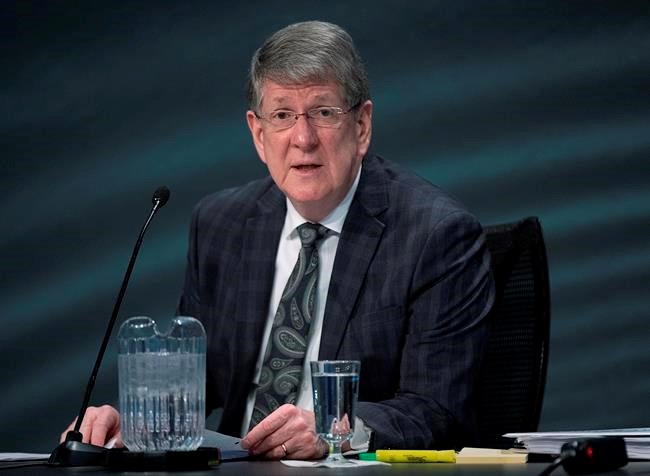HALIFAX ŌĆö A public inquiry into Nova Scotia's mass shooting will call RCMP witnesses to testify, but lawyers for victims' families say they are concerned over rules limiting their ability to directly question officers.
Michael MacDonald, chair of the Mass Casualty Commission, said Wednesday the commission will subpoena the first three officers to arrive at the scene of the killings, as well as five supervising officers and four senior officers ŌĆö including RCMP Commissioner Brenda Lucki.
The three first responders to testify are constables Stuart Beselt, Adam Merchant and Aaron Patton, who reached the scene in Portapique, N.S., starting at about 10:25 p.m. on April 18, 2020.
The RCMP's lawyer and their members' union have resisted calls for officers to testify about the police response to the April 18-19, 2020, killings of 22 people by a man driving a replica police vehicle. They have said RCMP officers risk being re-traumatized on the witness stand.
However, MacDonald said arrangements can be made to ensure the trauma of testifying is reduced.┬Ā
"This is accomplished by giving clear direction about what is being asked, a respectful environment, and the possibility of taking breaks," said the former chief justice of the province.
MacDonald said the trio of front-line officers will testify together in a witness panel later this month, with the initial round of questions coming from the commission's counsel. But he said lawyers for the victims' families will need to seek permission from inquiry commissioners to ask questions.
Michael Scott, a lawyer for 14 of the 22 victims' families, told reporters Wednesday he's glad the witnesses will be under oath, but he said he takes issue with the fact he has to seek permission before he can question officers.
Tara Miller, a lawyer for two families, said she's also concerned about "the fettering of our ability to cross-examine."
The families' lawyers had criticized an initial proposal that the witness panel of Patton, Merchant and Beselt would only deal with the officers' "experiences" on April 18, 2020. Lawyers had said they wanted to ask questions about the facts of what occurred and the decisions officers made.
For example, the family lawyers want to know more about why the RCMP members chose to proceed on foot, straight ahead, on the main road into the community, rather than turn left and head toward the scene of an initial 911 call from a dying victim.
MacDonald said the witness panel on March 28 with the three first officers will allow for exploration of how and why they made their decisions.
He also noted that in May, the commission will be delving into the decisions commanding officers made during the killings, as well as the orders that Beselt, Patton and Merchant followed. "Nonetheless ŌĆ” because their roles are so central, we are persuaded we should hear from them at the earliest opportunity."
Const. Vicki Colford, who was among the first four officers to arrive to the scene on April 18, 2020, will be called in late March to testify as an individual witness to answer further questions about her role assisting an injured resident and keeping watch at the main entrance to the community on Highway 2.
MacDonald said staff sergeants Steve Halliday, Addie MacCallum, Andrew O'Brien, Brian Rehill and Jeff West will be called as witnesses in the second half of hearings, after the commission hears more of the summaries of what occurred during the rampage, referred to as "foundational documents."
In addition, the commission intends to call Lucki, Chief Supt. Chris Leather, Supt. Darren Campbell and assistant commissioner Lee Bergerman to testify individually later in the process.
This report by The Canadian Press was first published March 9, 2022.
Michael Tutton, The Canadian Press



